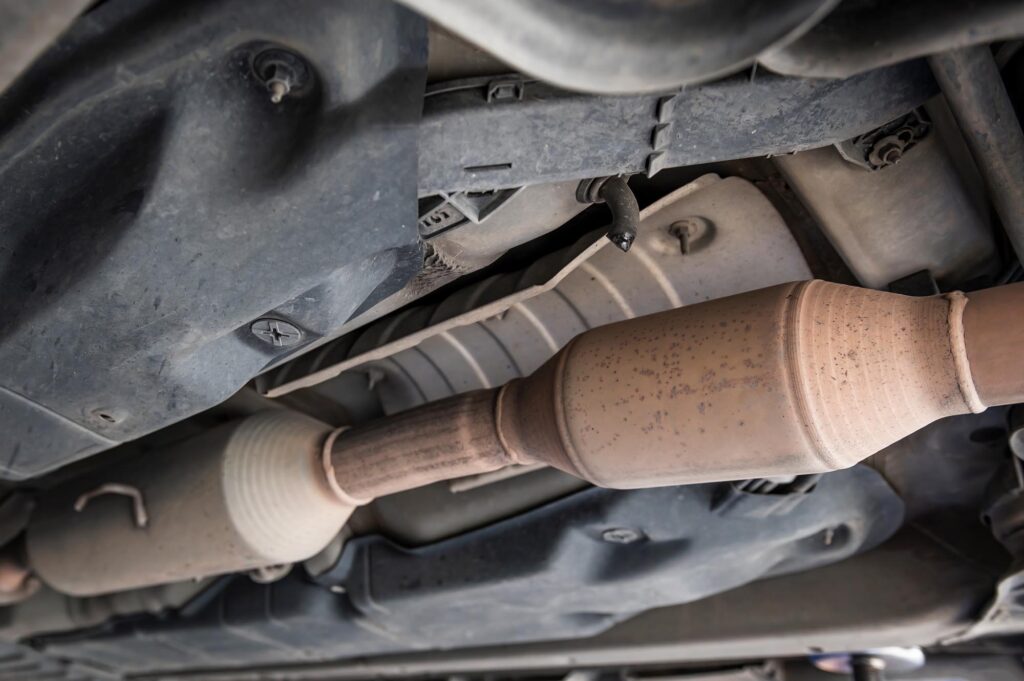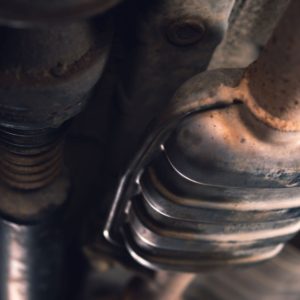At some point, you might have asked yourself: “Is the catalytic converter supposed to rattle?”
The answer is no.
Normally, rattling catalytic converters are caused by loose heat shields. If this happens, a simple fix would be to deal with the heat shield. However, if the rattling comes from the catalytic converter itself, it might be a sign to get it replaced.
Still, it’s important to fix the root cause of the problem first to prevent the replacement catalytic converter from suffering the same fate. Keep an eye out for the different problems that could cause rattling in your catalytic converter:
- Weathering from age and overuse
- Damage in the honeycombs
- Heat shield has come loose
- Clogging caused by the buildup of oil and dirt
Some have quick fixes, while others require a catalytic converter replacement to resolve.
3 Reasons Why the Catalytic Converter Is Rattling

If you’re wondering whether or not it’s safe to drive with a rattling catalytic converter, it’s important to consider the risks a rattling converter entails. To do so, you’ll need to learn what causes catalytic converters to rattle in the first place.
Here’s a list of the different problems that could cause rattling noises from your vehicle’s catalytic converter:
Weathering From Age and Faulty Engines
Catalytic converters will inevitably weather the more you drive your vehicle, causing it to rattle. On average, a catalytic converter lasts up to 10 years.
Despite their long service life, many catalytic converters fail prematurely in rough driving conditions. For example, a faulty engine could cause a catalytic converter to degrade faster than normal.
Simple Fix:
If your catalytic converter is too old and weathered to work, it might be best to have it replaced. Forcing an old device to work could do more harm than good.
A total replacement is safer than repairing something that’s on its last legs.
Broken Honeycombs
Broken honeycomb structures in the catalytic converter can cause it to rattle. These honeycombs serve as catalyst supports, catalyzing the burning of any leftover unburned fuel that comes from the exhaust. They minimize the overall emission of toxic gases from your vehicle.
If these honeycombs break, your engine (if not your entire vehicle) will be at risk of taking significant and expensive damage. It’s also worth mentioning that broken honeycombs can plug your exhaust and prevent the crank from starting. Because of this, it’s important to fix broken honeycombs as soon as possible.
Simple Fix:
Your best bet when it comes to dealing with a broken honeycomb structure is to get your catalytic converter replaced.

Damaged honeycomb structures tend to crack and fragment. On occasion, the heat can cause these fragments to fuse with other parts of the honeycomb.
Replacing the converter guarantees you won’t have to worry about clogged honeycombs.
Heat Shield Is Loose
The heat shield of the catalytic converter might be loose if you can hear rattling noises when you drive. This happens when the bolts have either been damaged by corrosion or come loose through overuse.
It’s dangerous to drive a vehicle with a loose heat shield because it helps prevent internal components from overheating. Simultaneously, heat shields protect things around the catalytic converter, shielding everything around the exhaust. Neglecting a loose heat shield puts your catalytic converter at risk of overheating.
Simple Fix:
If the heat shield of your catalytic converter is ever knocked loose, you must secure it immediately. Tighten the bolts or replace the heat shield. The heat shield can also be tack welded back in place if total replacement seems too drastic.
Clogging Caused by Contaminants
Lastly, if you hear any rattling noises coming from your catalytic converter, there’s a good chance it’s simply clogged. Oil, dirt, and other contaminants can get inside your catalytic converter while you drive, and they can build up over time.
It’s almost impossible to prevent blockage because gunk buildup is an inevitable part of every vehicle. Still, as prevalent as this problem is, don’t put off resolving it. After all, clogged catalytic converters can make your engine stall and struggle to accelerate, or even fail to start outright.
Simple Fix:
Fortunately, dealing with a clogged catalytic converter is relatively simple. While the simplest fix would be to replace the catalytic converter entirely, it’s worth trying to salvage your original first. Since catalytic converters cannot be unclogged with cleaning solutions, your best bet would be to try and find what’s clogging it and remove it.
Since catalytic converters cannot be unclogged with cleaning solutions, your best bet would be to try and find what’s clogging it and remove it.
–Anthony Harlin, ASE Certified Master Automobile Technician
Is It Bad to Drive With a Rattling Catalytic Converter?

Driving with a rattling or damaged catalytic converter isn’t too dangerous. However, it increases your vehicle’s harmful emissions, which in turn means you’ll be exposed to more pollutants.
The odds of a damaged converter getting you into a car accident are quite low because it won’t affect how you drive in the same way that a vehicle’s brake system or engine does.
Bear in mind that this doesn’t mean you should drive with a rattling catalytic converter. Faulty catalytic converters can still cause damage to the engine, and the odds of your vehicle failing emissions tests will increase drastically.
Because of this, you should get your catalytic converter repaired or replaced as soon as it shows signs of age or damage.
Any information provided on this Website is for informational purposes only and is not intended to replace consultation with a professional mechanic. The accuracy and timeliness of the information may change from the time of publication.



























